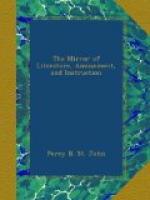Title: The Mirror of Literature, Amusement, and Instruction Volume 17, No. 476, Saturday, February 12, 1831
Author: Various
Release Date: June 9, 2004 [EBook #12567]
Language: English
Character set encoding: ASCII
*** Start of this project gutenberg EBOOK mirror of literature, no. 476 ***
Produced by Jonathan Ingram, David Garcia and the
Online Distributed
Proofreading Team.
THE MIRROR OF LITERATURE, AMUSEMENT, AND INSTRUCTION.
Vol. XVII, no. 476.] Saturday, February 12, 1831. [Price 2d.
* * * * *
LORD BYRON’S PALACE, AT VENICE.
[Illustration: Lord Byron’s palace, at Venice.]
Scores of readers who have been journeying through Mr. Moore’s concluding portion of the Life of Lord Byron, will thank us for the annexed Illustration. It presents a view of the palace occupied by Lord Byron during his residence at Venice. When, after his unfortunate marriage, he left England, “in search of that peace of mind which was never destined to be his,” Venice naturally occurred to him as a place where, for a time at least, he should find a suitable residence. He had, in his own language, “loved it from his boyhood;” and there was a poetry connected with its situation, its habits, and its history, which excited both his imagination and his curiosity. His situation at this period is thus feelingly alluded to by Mr. Moore:—“The circumstances under which Lord Byron now took leave of England were such as, in the case of any ordinary person, could not be considered otherwise than disastrous and humiliating. He had, in the course of one short year, gone through every variety of domestic misery;—had seen his hearth eight or nine times profaned by the visitations of the law, and been only saved from a prison by the privileges of his rank. He had alienated, as far as they had ever been his, the affections of his wife; and now, rejected by her, and condemned by the world, was betaking himself to an exile which had not even the dignity of appearing voluntary, as the excommunicating voice of society seemed to leave him no other resource. Had he been of that class of unfeeling and self-satisfied natures from whose hard surface the reproaches of others fall pointless, he might have found in insensibility a sure refuge against reproach: but, on the contrary, the same sensitiveness that kept him so awake to the applauses of mankind rendered him, in a still more intense degree, alive to their censure. Even the strange, perverse pleasure which he felt in painting himself unamiably to the world did not prevent him from being both startled and pained when the world took him at his word; and, like a child in a mask before a looking-glass, the dark semblance which he had half in sport, put on, when reflected back upon him from the mirror of public opinion, shocked even himself. * * *




